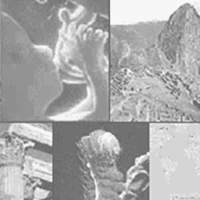
(Daniel Julio/Unsplash)
Is there anything worse than being wrong about something as a creator focused on history? The answer is probably no—how could there be anything worse?!?
But seriously though, I found a lot to respect about YouTuber and research nerd Tom Scott’s very honest take that he made a mistake in an earlier video about fire marks—specifically, that the main thesis in his prior video, that fire brigades would not put out fires at houses without fire marks, was wrong.
And he laid out the error in a video that expressed regret about what happened.
To be fair, nailing down this detail was apparently very hard, and the error emerged in part because a source that seemed reliable on this topic, the London Fire Brigade, actually said so on its website, which originally said:
If a building was on fire, several brigades would attend as quickly as possible. The different brigades would use the fire marks to work out if a building was insured by their parent company. If they didn't see their specific fire mark attached to the building, they would leave the property to burn.
But then the brigade changed the website, which now says:
Popular stories suggest that insurance firemen would leave a building to burn if it wasn’t insured or insured with a rival company. There is little real evidence to suggest that this was the case. In fact, evidence shows that insurance companies had strict rules that on pain of dismissal, their firefighting teams should attend every fire they encountered, whether the property was insured or not and regardless of which company it might have been insured with. Any fire left unchecked could spread to whole streets or neighbourhoods and involve the insurance companies in large scale losses. Mutual co-operation was therefore extremely important.
(It seems like the London Fire Brigade deserves some of the blame for spreading the fire around this fascinating factoid!)
But when it seemed like Scott had clearly made a mistake, he took the time to fix it—he removed the prior video from public view (which I’m linking here for posterity, note that it has been retracted). He then hired an actual archivist to research this exact issue, then put up the research around the topic on his website. That research laid out what actually happened like this:
In the early years of fire insurance, insurance company fire brigades seemingly made little distinction between insured and uninsured properties. They were instructed to attend and help put out all fires. The grounds for this policy included the risk of fire-spread between uninsured and insured properties, the advertising value of the firemen and their engines, and charitable acts for those who could not afford insurance.
In principle, this policy seems to have remained in force throughout the 18th century. In practice, though, changing circumstances led to keen rivalry between fire brigades, whether insurance company, parish or private. Firstly, monetary rewards were introduced for the earliest attendees at fires. That innovation led to engines racing each other through the streets. As the number of fire insurance companies grew, so, too, did the number of fire engines. Once at the fire, too many engines were too often competing for very limited water supplies.
When the nature of the firemen is added to this situation, the scene is set for more competition, and chaos. This, in turn, can reasonably be imagined as having led to conflict—both verbal and physical. With no reward, no water, and no insurance interest in a burning building, it is not difficult to envisage firemen standing back on occasion, jeering and generally interfering with rival brigades fighting a fire in which they did have an interest. Or, alternatively, simply packing up and going home. Arguably, therefore, the legend of insurance fire brigades letting uninsured buildings burn originated in the first half of the 18th century.
Essentially, heavy competition between fire brigades may have led to situations where competing fire brigades might have intervened or event left, but that was only because they missed out on the financial rewards of being first.
Scott makes an excellent point about this state of affairs in his video, which is simply that history is often far more malleable than we give it credit for.
“If any history students are looking for a PhD topic, it feels like you could get three years of research out of this and still not end up with a definitive yes or no,” he said. “It's a perfect example of how quickly and how badly even big important stories can become muddled, and how the study of history is not about memorizing dates: It's about the interpretation of really messy, patchy data.”
I’ve run into this in the past in a few cases, most notably in 2017 where I wrote a piece about CD-ROM encyclopedias, and the CEO of Encyclopaedia Britannica during the era, Joseph Esposito, disagreed with the assessment that the company had lost its way during the CD-ROM era. Even when all of the stakeholders are alive, everyone can have a different interpretation of what happened, famously referred to as the Rashomon Effect after the legendary Akira Kurosawa film that uses this truism as a plot device.
But when you’re talking about situations where literally everyone involved in a situation has long been dead, that’s where you run into trouble, and this is an area where Scott fell into a trap. But to be fair, the London Fire Brigade set the trap by saying one thing, then rewriting its history to say something else entirely, while also not taking credit for originating the error.
All of this is why, whenever possible, I try to link to primary sources, rather than after-the-fact interpretations, because odds are, if something happened, you’re most likely to hear the straight stuff from the primary source. But even then, primary sources can only go so far. After all, the Rashomon Effect existed back then, too.
I think Tom did a great job of showing that he is to be taken seriously by taking an error of this nature so seriously. It is so hard to get this stuff right, even when it’s literally your job.
Time limit given ⏲: 30 minutes
Time left on clock ⏲: 1 minute, 29 seconds



